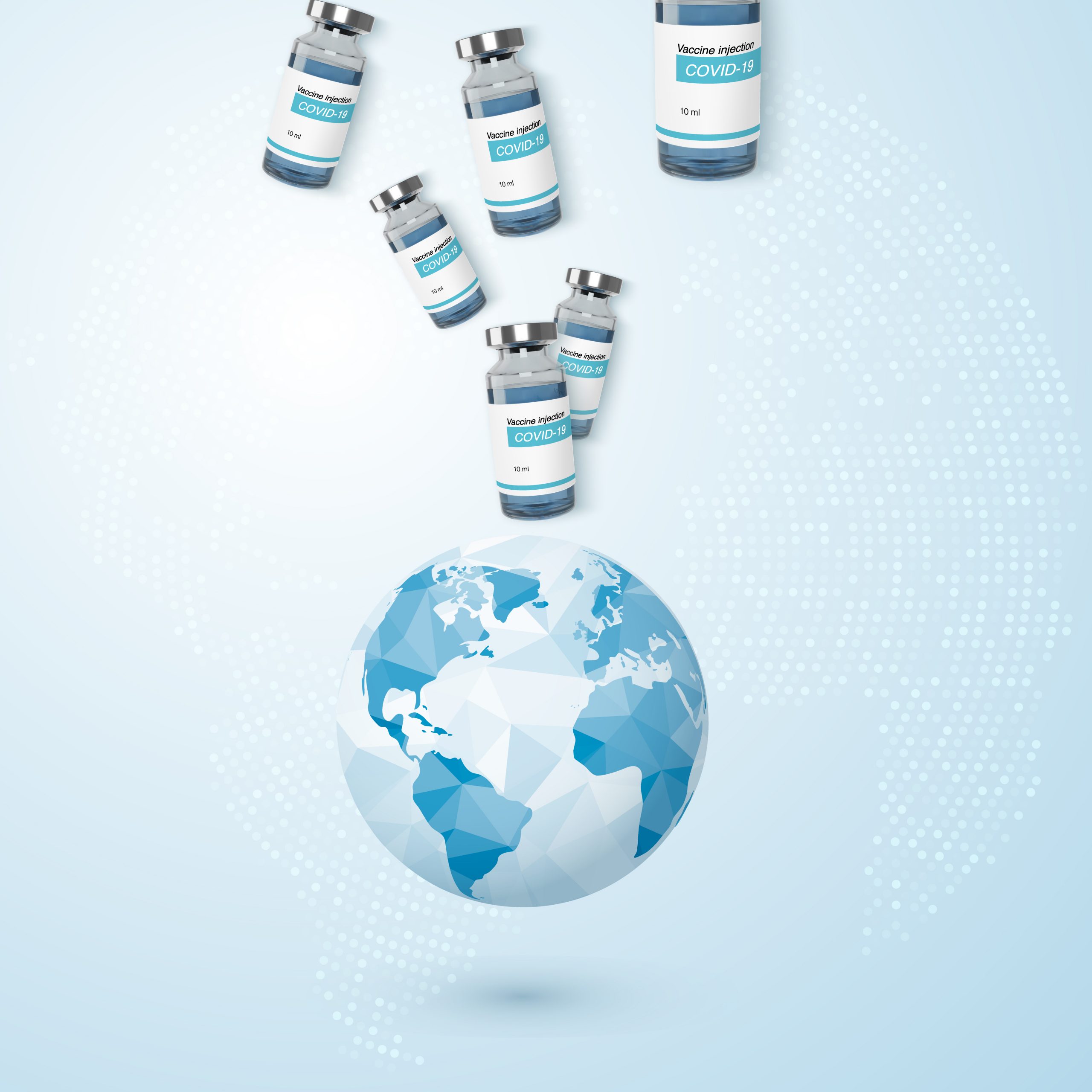“Incentivized limited IP waivers may offer a compromise to bridge the gap between maintaining IP rights (and thus relying on charity alone) and arbitrary compulsory licensing.”
 In the early days of the vaccination efforts, Americans were anxiously online trying to register for a COVID-19 vaccination appointment. Reports of success at 1:30 am and 2:30 am made the rounds as new appointments dropped onto websites. Also common were stories of vaccine elitism and discussions of which vaccine is “the best.” News reports continue to show a steady uptick in the percentage of vaccinated Americans.
In the early days of the vaccination efforts, Americans were anxiously online trying to register for a COVID-19 vaccination appointment. Reports of success at 1:30 am and 2:30 am made the rounds as new appointments dropped onto websites. Also common were stories of vaccine elitism and discussions of which vaccine is “the best.” News reports continue to show a steady uptick in the percentage of vaccinated Americans.
Elsewhere in the world though, the story is very different, and a darker picture is emerging. In Africa, many countries have vaccinated less than 2% of their population. While vaccine distribution is difficult in many regions of the developing world, this is a hurdle that medical assistance groups, such as Doctors Without Borders, are accustomed to handling. The challenges are known. What is most difficult in combating COVID-19 is obtaining the vaccines in the first place. Some argue that IP rights are the key problem and should be waived, while others claim they are the only solution and that waiver would be catastrophic. This article suggests a third option, somewhere between voluntary vaccine donation and a full waiver of IP rights, that may offer a way forward.
Many Hurdles
As has been written here before, the difficulty in vaccinating those in less developed countries is, in part, supply and demand. Wealthier countries have already purchased most of the vaccine supplies produced by the major vaccine suppliers. Some countries, including the United States, have stated that some vaccines will be donated to other countries. While laudable, these efforts are piecemeal, entirely voluntary, and still may not fully resolve the supply and demand issues. Other than opprobrium, there are no mechanisms to force major industrialized nations to purchase and donate vaccines or to convince vaccine developers to donate their in-demand product.
One proposal to address vaccine supply issues has been suggested by India and South Africa. These two countries want the World Trade Organization (WTO) to waive intellectual property rights, so countries around the world can produce vaccines.
This proposed solution is attractive to countries like India and South Africa, which have pharmaceutical and vaccine manufacturing capability. Increasing COVID-19 vaccine production may take years, however, in countries without manufacturing facilities. Building the facilities and beginning production may not be possible before the end of the current pandemic.
Naturally, most countries where some of the largest vaccine makers are located, such as the United Kingdom, strenuously object to the waiver proposal. While the Biden administration has indicated some support, Germany remains firmly opposed. These objections are based, in part, on the large investments made in research and development, in many cases, over decades, that were used in developing not just a new vaccine, but also a new vaccine technology (mRNA vaccines) used for the first time. The United Kingdom and the European Union continue to argue that intellectual property rights are a key component driving innovation. They claim that waiving IP rights would not increase production and would discourage future investment in new technologies and solutions.
Patent rights in particular are of concern to the vaccine developers. The limited-time patent monopoly and the potential profits received during this time are incentives for companies to make the massive investments in research and development. Companies use the patent term to recoup their investment and make a profit. Like new drugs, each vaccine may be the product of thousands of failed experiments and research dead-ends, most of which are unknown to the public. With respect to COVID-19, the vaccine developers further are continuing their research, anticipating and targeting virus variants, which could be crucial for ending the current pandemic and halting a future pandemic. Ongoing research also may extend the benefits of a new drug to new patient populations and even our pets.
Waiving IP rights also could raise safety issues given that some COVID-19 vaccines are difficult to produce, store, and distribute. IP rights permit the vaccine developers to enter into agreements with trusted partners to make and distribute vaccines. They can be selective about their partners. Waiving IP rights removes this safety mechanism. Addressing the problems of safety and viable partners requires that health care infrastructure, including medical personnel, be developed and improved.
Where Compulsory Licensing Falls Short
The patent system does have a number of “circuit breakers” that allow government intervention before a patent term expires. A compulsory license is one such circuit breaker. When a public need or emergency arises, such as a pandemic or war, an issuing government may allow others to make the product, typically with a reasonable royalty paid to the patent owner. Any country that has issued a COVID-19 patent may issue a compulsory license to enable production by companies within the country.
The key phrase “within the country” is where the problem arises with the COVID-19 pandemic (and future pandemics). In many countries with dramatically increasing COVID-19 cases and deaths, there are no vaccine manufacturing facilities. This leads to the question: Why don’t countries that allow compulsory licensing and have pharmaceutical industries issue compulsory licenses that allow export to countries without pharmaceutical industries? The answer: those countries get tripped up by TRIPS, the Agreement on “Trade-Related Aspects of Intellectual Property” signed onto by all members of the WTO. TRIPS limits compulsory licenses to domestic production and use; countries cannot mandate that companies produce products for export.
Previous agreements attempting to solve the problem have been cumbersome, lengthy, and unsustainable for patent owning companies. In some cases, significant time and regulatory changes in the developing country were needed to navigate through the regulatory maze of the 2005 TRIPS agreement.
The IP waiver proposal put forward by India and South Africa is a broad waiver from the TRIPS rules on the production and export of vaccines. Over 100 countries and Pope Francis support this proposal, but it raises real risks for vaccine developers as well as affecting its ability to recoup costs and fund future development.
Limited Waiver Approach
This article suggests a third option, between voluntary vaccine donation and the full IP waiver proposal, that may offer a way forward. The third proposed solution is incentivized limited IP waivers that could encourage (or require) private companies to engage in licensing agreements with nations to share some, but not all, of the knowledge and designs covering the COVID-19 vaccines to the developing world. The limited IP waivers could cover the minimum necessary portions of the technology to produce basic COVID-19 vaccines. The waivers could be limited in time to the duration of the pandemic, or another term agreed to by the WTO. The term could also be defined as ending when widespread vaccination and immunity goals are achieved. The incentive for pharmaceutical companies to support such limited IP waivers could be provided in the form of patent term extensions for the technology covered by the limited IP waivers.
Extensions of patent term are already known and widely used. In the U.S., patent term adjustments are automatically added on to the patent lifespan to account for any delays by the USPTO in the patent prosecution process. In some cases, these mechanisms may extend the patent term for years. Patent term extensions also are available for regulatory delays (35 U.S.C. § 156). In particular, patents covering, inter alia, drug products approved by the United States Food & Drug Administration may be eligible for up to five years of additional patent term to give back time required to complete the regulatory review process. Both patent term adjustments and patent term extensions arise from activities beyond the control of the pharmaceutical companies. A pandemic patent term extension fashioned after such known extensions could be made used to compensate for the current pressing global health needs.
This third proposal may be achievable at the WTO. Hurdles remain and it could be months or years before the WTO reaches an agreement on any waiver of IP protections, and years before countries build factories, gather materials, and gain the expertise to produce the vaccines. A steep hurdle is that mRNA is a new technology, with no machines or experts for hire. Nonetheless, the third solution offers hope to find a middle ground that may begin to be implemented before the end of the current pandemic and be in place for the future.
The patent term extension could be provided for countries with patent offices and could be adapted based on laws and conditions in each country. Pandemic-related patent term extensions could be given for a period of time that the compulsory license is in force. With current pandemic projections of six months to two years for sufficient distribution, providing a patent term extension is reasonable and in line with the time period of many patent term extensions. Given that most pharmaceutical patents are prosecuted in multiple countries, this provides an incentive to participate in a limited waiver program.
Let’s Not Repeat Past Mistakes
It’s been a century since the last pandemic devastated the globe and the only certainty is that this will not be the last pandemic. Solutions created today lay a foundation for mitigation of the next pandemic. It’s been said that those who refuse to learn from history are doomed to repeat it, a thought too painful to contemplate with a pandemic. The industrial nations of the world have technology that others are literally dying to obtain—a high price to pay. Incentivized limited IP waivers may offer a compromise to bridge the gap between maintaining IP rights (and thus relying on charity alone) and arbitrary compulsory licensing that could deter the technological investment to create life-saving solutions in the future.
Image Source: Deposit Photos
Vector ID:457883132
Copyright:[email protected]

![[IPWatchdog Logo]](https://ipwatchdog.com/wp-content/themes/IPWatchdog%20-%202023/assets/images/temp/logo-small@2x.png)

![[[Advertisement]]](https://ipwatchdog.com/wp-content/uploads/2024/04/Patent-Litigation-Masters-2024-banner-early-bird-ends-Apr-21-last-chance-938x313-1.jpeg)

![[Advertisement]](https://ipwatchdog.com/wp-content/uploads/2024/04/Patent-Litigation-Masters-2024-sidebar-early-bird-ends-Apr-21-last-chance-700x500-1.jpg)

![[Advertisement]](https://ipwatchdog.com/wp-content/uploads/2021/12/WEBINAR-336-x-280-px.png)
![[Advertisement]](https://ipwatchdog.com/wp-content/uploads/2021/12/2021-Patent-Practice-on-Demand-recorded-Feb-2021-336-x-280.jpg)
![[Advertisement]](https://ipwatchdog.com/wp-content/uploads/2021/12/Ad-4-The-Invent-Patent-System™.png)







Join the Discussion
3 comments so far.
Obviate
July 21, 2021 02:40 pmWherever there is no patent prosecution, people are free to practice the invention.
xtian
July 21, 2021 11:24 amRead this over and over….
“This leads to the question: Why don’t countries that allow compulsory licensing and have pharmaceutical industries issue compulsory licenses that allow export to countries without pharmaceutical industries? The answer: those countries get tripped up by TRIPS, the Agreement on “Trade-Related Aspects of Intellectual Property” signed onto by all members of the WTO. TRIPS limits compulsory licenses to domestic production and use; countries cannot mandate that companies produce products for export.”
Its not about patents. It’s not about compulsory licenses. Focus on the last phrase. These people just can’t understand why one country cannot force another country to give them what they want! What is wrong with the law when I cannot compel another to give me what I want?! /sarc off/
Anon
July 21, 2021 10:21 amIn order to understand the bigger picture, such statements as, “Patent rights in particular are of concern to the vaccine developers” need to be refuted.